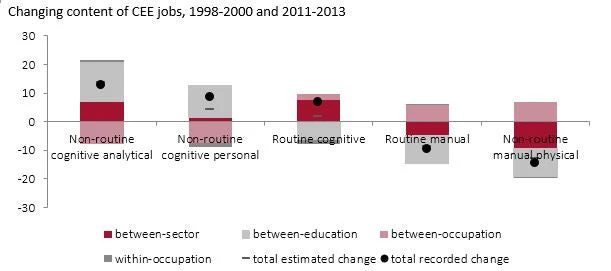
Exponential increases in automation, computerization and digitization is having a profound impact on many people’s jobs. Branko Milanovic’s recent work on global inequality has shown extent to which the lower-middle class jobs in developed countries are being replaced by technology. In particular, economists argue that middle-skilled, routine-intensive jobs are being hollowed-out. And indeed, in Western European countries and the US there has been a decrease in the intensity of routine tasks – both manual and cognitive. However, in Central and Eastern European (CEE) countries, the amount of routine cognitive work has been on the rise. And the pay for these workers has increased faster than for high skilled workers. Why is this happening, when in the most advanced economies the opposite is happening?
In CEE countries there has been a shift from manual (both routine and non-routine) work to cognitive work. The intensity of non-routine cognitive tasks (i.e. the average level of such tasks per worker), which are complementary to ICT and performed mainly by high-skilled workers has also increased. But the growth of routine, cognitive tasks distinguishes CEE countries.
In a recent IBS policy paper, we find that these changes in the task composition of jobs can be largely attributed to both structural and educational changes. In particular, structural change drove the increase in the routine, cognitive component of jobs. The employment share of agriculture shrank, and that of services thrived. Manufacturing’s employment share decreased slightly but still remained high (on average 23% in CEE in 2013).
In countries such as Poland or Romania, the share of agricultural employment plunged, and the effect of structural change was especially pronounced. At the same time, better educated workers slowed the increase in routine cognitive tasks, as countries like Poland and Slovenia recorded the large growth in tertiary attainment in the region. This educational shift pushed up non-routine, cognitive tasks.

Source: Keister & Lewandowski (2016)
The second group has a 75% probability of having a highly routine cognitive job is nearly 90% women who were secondary educated. This group of workers perform simple office jobs. Workers in this group do very few manual tasks, and are mainly employed in either market or non-market services. They also earn rather low wages. Jointly, these two groups constituted 33% of employment in CEE in 2013.
In the US and Western Europe, the wages of middle-skilled workers performing routine tasks have declined in comparison with high-skilled workers performing non-routine tasks. That is because technological change has reduced the demand for workers performing routine tasks. But the CEE countries are different.
In 2002-2010, jobs with a high share of routine cognitive tasks enjoyed a strong increase in hourly wages (see below). Moreover, the wage growth in routine-intensive cognitive jobs, i.e. among office or factory workers, was higher than the wage growth rate in markedly non-routine jobs. It seems that the demand for workers performing routine tasks was strong in CEE. This could be because of a substantial wage difference between CEE workers and those in Western Europe: in 2010 the prices of particular tasks in CEE were a quarter of the prices of comparable tasks in the UK. Importantly, the relative price of routine cognitive tasks grew most in CEE in 2002-2010, so in 2010 their relative price was the highest among all tasks (28% of the UK price).

Source: Keister & Lewandowski (2016)
Follow the World Bank Jobs Group on Twitter @wbg_jobs



Join the Conversation